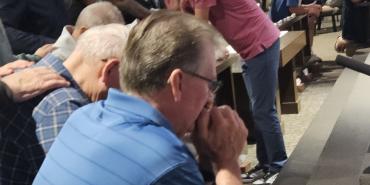It All Started with a Simple Conversation
It's Sunday morning in Paramaribo, Suriname, and a group of girls dressed in their prettiest attire have gathered to sing a song for the congregation at New Charlesburg Church of the Nazarene. A fresh-faced girl with braids begins to fervently sing the words, and four others follow her lead. The song ends, people clap, and the five smile as they walk back to their seats.
Even in a country where only 20 percent of people are Protestant, this kind of scene isn't altogether unusual. Neither is the fact that a young man and his brother play keyboard and drums during the worship gathering. Or that these gifted adolescents show up for Sunday School most weeks.
But you might be surprised to learn that these kids-and the 35 others in the congregation-have all come from a nearby orphanage.
A group of unlikely kids now play an integral role in the life of this church in Suriname's capital city. And it started with one conversation.
Feeling Right at Home
When Tajere "Bish" Sewkumar learned in conversation about the needs of children living in an orphanage near the New Charlesburg church he pastors, he quickly said, "We'll do what we can."
Ninety-five kids, toddlers through teens, live at the Kinder House orphanage. Some have no living parents, and others have parents who can't care for them. Some are neglected, and others can't function well in their home environments. But they all share a background of poverty.
New Charlesburg isn't a wealthy church. In Suriname, the average income is $471 (USD) a month. But the people of the New Charlesburg Church of the Nazarene have decided to help these children, even if it means sacrifice.
Several women from the church regularly save to buy food so they can cook meals and celebrate birthdays at the Kinder House. They also invest in young lives in other ways. Women spend time with the girls, teaching them life skills, such as how to cook or run a business, and talking to them about things that matter. Men do similar mentoring for the boys.
The church also rents vans to provide transportation for kids who want to go to church on Sundays. Sewkumar, who also serves as the district superintendent in Suriname, admits that these costs can be burdensome. "But," he says, "we find joy in doing it. . . . These kids love our church, and most of all they love the Lord Jesus."
What began as a simple act of compassion turned into a relationship that's changing the fabric of the church.
The simple things a local congregation is doing for one orphanage are weaving together the lives of those kids with the rest of the church.
"They are part of us," Sewkumar says. "These children—they are souls in God's kingdom. . . . As we bring them in the church, we're incorporating them into the life of the church."
The Heart of the Matter
Last year New Charlesburg completed a large sanctuary and district center, thanks to a generous donation. Today the congregation is saving to buy more chairs. "We don't have enough," Sewkumar explains. "We've grown very rapidly."
The reason for this growth isn't complex. The yellow stucco building is both functional and beautiful, but rather than becoming comfortable within those thick walls, the church members are getting outside the walls as often as possible.
In this dynamic climate, the Church of the Nazarene is growing. Besides four churches in Paramaribo and one in the Amazonian village of Apura, the district has three church starts meeting in houses. The newest of these is reaching out to a historically underserved population in Paramaribo. Known as "maroons," the group traces their heritage to the former slaves who fled to the jungle to escape colonial oppression.
When a few people from that community visited the New Charlesburg church, Pastor Sewkumar paid a visit to their neighborhood. While there, he was struck by the needs he saw.
"My heart goes out," he says. "I'm seeing they need help. They need nutritious food and don't have any running water where they live. And I want to teach them about Jesus."
Feeding Souls
And so, taking the words of Matthew 25:35 literally—"For I was hungry and you gave me something to eat . . ."—church members bought food and took gift bags to those in need.
Just as they had done at the Kinder House, the church refused to stop at impersonal charity. Instead, they entered a relational, generous kind of caring.
"We went into their homes," Sewkumar says.
Soon the district started a mission church in that community. The first Sunday, 30 people found their way there. The next, 40 people attended. And on the third week, 45 people gathered. "God is doing something great in our midst," Sewkumar shares. "People know we're concerned about their needs."
The goal of the Church of the Nazarene in Suriname? To share God's love. Their method? Meeting needs. They can meet those needs because they know them firsthand. And they know them because they're getting into the lives of people.
"We want to be a friend," Sewkumar says.
It's not a gimmick or a strategy that a church planting consultant spent days presenting in a slick PowerPoint presentation. It's simply a church showing love. And it all started with a simple conversation.
Beth Luthye worked alongside her husband, Curt, to serve the people of the Caribbean.
Nicknamed "the beating heart of the Amazon," Suriname pulses with cultural diversity. In this tiny country, sandwiched between Guyana and French Guiana on the northern border of Brazil, the descendants of native Amerindians, African slaves, and Dutch and British colonialists mix together with the descendants of Indian, Chinese, and Indonesian indentured servants to form a people uniquely Surinamese.
Holiness Today, Sept/Oct 2009
Please note: This article was originally published in 2009. All facts, figures, and titles were accurate to the best of our knowledge at that time but may have since changed.




